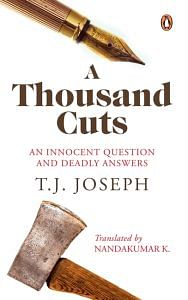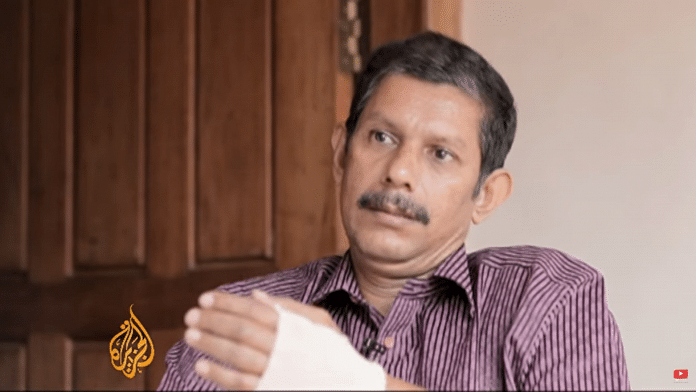Setting a question paper is not to be taken lightly; it needs creativity. A person who sets purposeful questions in humanities must surely undergo the painful throes of creativity. Which is why most teachers tend to take refuge in question papers of previous years. This shortcut is what makes students believe that if they learn the answers to questions that have appeared over the previous decade, high marks are theirs for the taking.
I have never been in favour of copy-pasting from old question papers. In over twenty-five years of my career as a teacher, not once have I done it. When I am setting a question paper, the only two things in front of me are the syllabus and the prescribed texts.
In front of me was Ezhuththola, a text created to help students avoid the usual pitfalls in the use of the language and to engender in them chaste diction. I prepared a few questions under the heading ‘Correct the Errors’. Next, I needed questions from the chapter ‘Punctuation’. It describes each of the punctuation marks and gives examples of their usage. How does one prepare engaging questions on this? It wouldn’t suffice if I set questions to use each of the signs in isolation. After some thought, I decided: ‘Rewrite the passage below with appropriate punctuations.’ Then I pondered over a passage that would be appropriate for this exercise.
Thirakathayute Reethisastram (Methodology of Screenplay)—a compilation of essays by prominent Malayalam filmmakers on script[1]writing, edited by P.M. Binukumar—is a Kerala Bhasha Institute publication, prescribed as a reference text for BA and MA courses in Malayalam of Mahatma Gandhi University. One of the essays in it is ‘Screenplay: Discoveries of a Believer’ by filmmaker and social worker P.T. Kunju Muhammed. A dialogue within the text suggested itself as the one that I should use for the question on punctuations.
Also Read: The silent segregation Muslim students from Hindus in Bhopal’s schools
In the article, Kunju Muhammed postulates that the structure, the energy, and the impetus for a script can be found within one’s own environment. He narrates the story of a mad man from his native place, who formed the inspiration for a scene in his movie Garshom where the protagonist is speaking with God. Kunju Muhammed quotes the mad man as he holds a dialogue with God.
Mad man: Creator, Creator . . .
God: What is it, sonofabitch?
Mad man: A mackerel—if one cuts it, how many pieces will there be?
God: You dawg, how many times do I have to tell you it’s three?
The mad man is doubling up as God in this conversation.
I put it down in the question paper. I did have fleeting thoughts about the appropriateness of God calling someone a sonofabitch.
However, abuses are as essential to language as endearments. A besotted lover addressing his beloved as his treasure and a wife calling her abusive husband Kaalan (vernacular for Yama, the God of Death) are embellishments in the use of language. It is such figurative usage, beyond their literal sense, that gives energy and life to language.
I decided to include the whole conversation between the mad man and God in the question paper. In any case, this was not a question for students of religious studies. For students of literature, shouldn’t all characters, whether gods, demons, devils, angels, devas, asuras or incarnations, be of equal standing?
I was still pondering over that piece of dialogue. In Kunju Muhammed’s article, the dialogue comes after the mad man’s backstory has been narrated. Here, when the backstory could not be told, I rationalized, wouldn’t it be better if a name were given to the interlocutor? Usually in Kerala, the community that refers to God as padachchon, meaning the Creator, is Muslim. I should choose a Muslim name, I decided. The writer who had narrated the mad man’s tale was himself a Muslim. I took out the initials of his name first. That left ‘Kunju Muhammed’.
That’s too long. Muhammed. That should suffice.
With my handwritten question paper, I moved to the DTP centre—a small room adjacent to the college library. The DTP operator was a twenty-seven-year-old girl who had been working there for nine years as a daily-wager. I showed her the question on punctuation and instructed her not to add any punctuation marks to it. After reading the dialogue, she laughed and asked me if I had written it myself. Gratified that the humour in it could make her laugh, I told her that it was taken from a book, and then proceeded to the canteen for a cup of tea.
Also Read: BJP, media, MHA — slander on Muslims and Sikhs have a lot in common. Outcome will be too
25 March 2010. It must have been some time past 8 p.m.—dinner time at home. Father Pichalakkat called me on my mobile phone.
‘There’s talk that there is some problem with our BCom semester question-paper,’ he said.
I asked anxiously, ‘What kind of problem?’
‘There’s some issue with the question you had set for punctuation.’
‘Who told you this, Father?’
‘It has come on Indiavision channel.’
I was flabbergasted.
‘Did you see the news, Father?’
‘No, a relative of mine from the Gulf who saw the news called me.’
Indiavision is a channel that was founded by a member of the Muslim community.
I explained to Father Pichalakkat that the extract in the question was taken from a book published by the Kerala Bhasha Institute, aided by the Union Ministry for Human Resource Development, and my reason for choosing it.
‘Then it’s okay,’ he said, and disconnected the line. His assurance didn’t put my mind at ease, though. A few other concerns rushed into my mind.
The next call came almost immediately—Dr Sankararaman, a professor in the physics department, and a close friend of mine. He lived close to the college. His words were full of alarm and concern. Things weren’t looking good. The talk was that the Prophet had been insulted and posters had been stuck on the college walls.
‘The Prophet has been insulted?!’ I was stunned. In the next moment, a flash of lightning seared through my mind. It was the realization that the truncation of P.T. Kunju Muhammed’s name to ‘Muhammed’ was being misinterpreted to create the controversy. I went numb.
‘I had used the name Muhammed in the question paper. Nevertheless, isn’t that a common name? If it were to connote the Prophet’s name, shouldn’t it have been Nabi (Arabic for Prophet and used thus in Malayalam) or Mohammad Nabi?’ My voice was tremulous.
‘All that is true. But if they create this false propaganda, who knows where this will end up?’ He sounded distressed. He rang off saying he would call later.
Also Read: India can’t alienate its 20 crore Muslims, not when Taliban are finding legitimacy, not ever
He called again in a short while. He told me that notices had been distributed in mosques in and around Thodupuzha exhorting the faithful to protest. He also advised me to get in touch with the member of Parliament from Idukki, P.T. Thomas, the candidate of the United Democratic Front alliance in which the Muslim League was a constituent.
Then I called K.I. Antony, a local leader in Thodupuzha, and appealed to him to intervene. He had been my colleague in Nirmala College, a professor in the Malayalam department.
The next call that I received was from Thodupuzha Deputy Superintendent of Police K.G. Simon. I narrated the background of the controversial question, and my non-culpability in the whole matter.
After that, there was a call on my landline—an unknown Muslim from Thodupuzha. After hearing the pronouncements in the mosque and exhortations to the community to protest, he had somehow discovered my number and called to find out the truth. I clarified the matter to him and he seemed satisfied.
His parting words were: ‘Thank you, sir. I understand the situation completely. The question now is: How can this be relayed to everybody here? Moreover, there are people in my community hell-bent on fomenting trouble.’
Also Read: Indian media is waging a holy war against Muslims. It acts like hyenas
I noticed a cup of black tea that someone had brought to me while I was busy on the telephone. I decided to drink it although it had gone cold. But before I could take a sip the phone rang again. It was a senior professor from the college, who I knew had connections with police officers in Thodupuzha. He advised me to move out of my house and stay away for some time.
‘Do you think someone may attack me?’
‘Not only that, there is also a possibility that the police may arrest you.’
‘Why? What crime have I committed?’ ‘Irrespective of that, there is a move to do that.’
‘Where did you get this information, sir? From the police department?’
‘You may consider it so. Anyway, don’t let them arrest you now.’
He had always been my well-wisher. I felt that I must heed his advice.
Thereafter, everything happened on a war footing. I rushed through my ablutions; I asked my wife, Salomi, to pack a bag with a change of clothes.
I decided to stay with a friend in Ernakulam and told my wife and son not to reveal my whereabouts. Should anyone enquire about me, they should tell them I had left for Thodupuzha town.
 This excerpt from ‘A Thousand Cuts: An Innocent Question and Deadly Answers’ by T.J. Joseph has been published with permission from Penguin Random House.
This excerpt from ‘A Thousand Cuts: An Innocent Question and Deadly Answers’ by T.J. Joseph has been published with permission from Penguin Random House.



